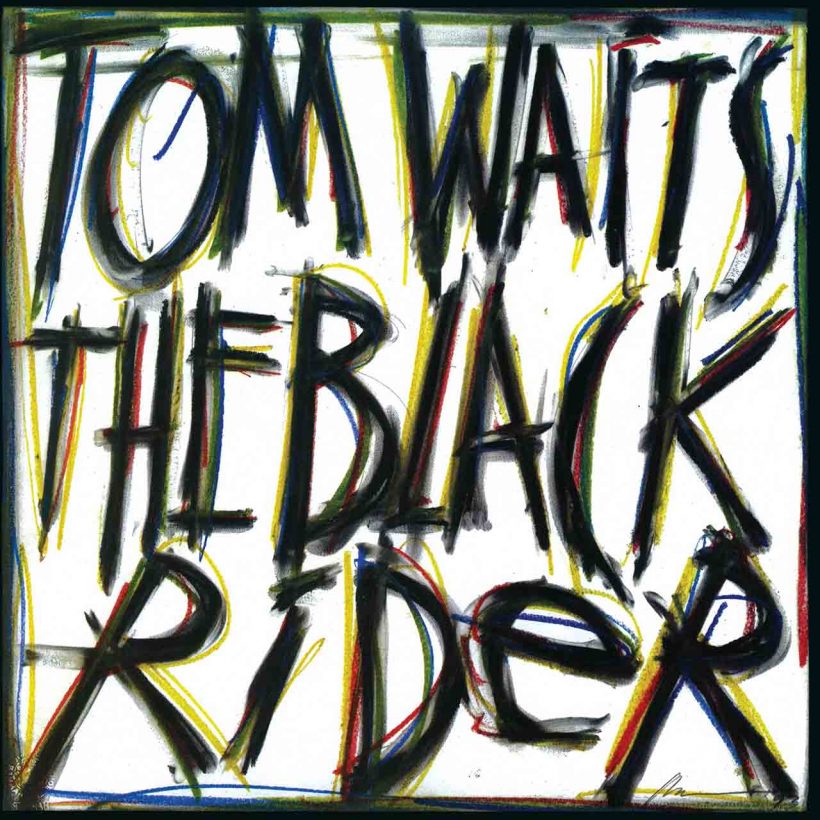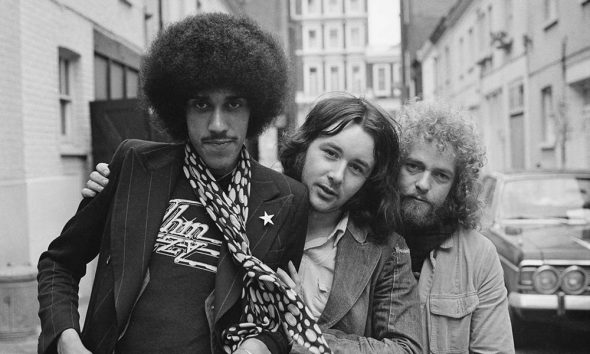‘The Black Rider’: How Tom Waits Faced the Devil Down
The album was an interpretation and performance of the songs Waits had originally created for the stage production of the same name.

A year after hammering his art down to its primal essence with the Grammy-winning apocalyptic stomp of 1992’s Bone Machine, Tom Waits ushered in a strange new beast on The Black Rider, with help from a legendary Beat author, an avant-garde theater visionary, and a nightmarish German folk tale.
The Black Rider is a musical comedy/horror collaboration between three powerful American artists: Robert Wilson (director/designer) writer/Beat guru William S. Burroughs (text), and Tom Waits (music). Not a cast album, this release is Waits’ interpretation and performance of the songs he had originally created for the stage production of The Black Rider.
The path to its creation began in 1988, when maverick playwright/director Robert Wilson needed a composer as unreservedly off-piste as himself to help craft his new musical. At the time, Wilson shared, “In my work, the emotion is sometimes hidden or buried and Tom’s music has a very deep emotional center for me.” Wilson was working on The Black Rider, a stage adaptation of an old German folk legend most famously told in Carl Maria Von Weber’s 1821 opera, Der Freischütz (The Marksman). That version featured an altered (happy) ending. Wilson-Burroughs-Waits telling is a dark, symbolic, and comedic affair.
Thumbnail plot sketch (spoiler alert): a young couple is forbidden to wed by the woman’s forester father because her beau is a clerk, not a hunter. To impress her father and win his bride, the young man, who can’t hit the broad side of a barn, makes a Faustian pact in exchange for magic bullets mysteriously guaranteed to hit anything he takes aim at, but the devil retains control over one bullet. Using that last bullet in a shooting contest on their wedding day, the clerk takes aim at a wooden dove, but the bullet finds and slays his bride.
Wilson picked an equally outside-the-box artist to write the play. There were probably plenty of reasons he chose Beat godfather William S. Burroughs, but the tragic 1951 accident in which Burroughs fatally shot his wife had to be somewhere in the director’s mind. In a 2006 podcast interview with Joel Selvin, Waits described Burroughs as “Mark Twain mad at you with a gun.”
The musical this rogue’s gallery concocted was equal parts tragic and terrifying. It premiered in Hamburg in 1990 and Waits went on to make Bone Machine. But he’d seemingly considered a Black Rider album all along, as half the tracks for Waits’s version were cut in 1989 in Hamburg during the making of the play. When the album appeared in September 1993, it was the first exposure to the tale for most people, even hardcore Waits obsessives.
The music is a Waitsian concoction of pop, vaudeville, rock, cabaret, and blues. Woozy arrangements full of tuba banjo, bass clarinet, cello, French horn, singing saw and other instruments not generally heard in contemporary pop music create a brew strangely familiar yet absolutely fresh. The New York Times wrote, “Waits has been creating a music that is beyond category – and beyond the scope of the character he portrayed in his early performances, the hard-drinking, gruff-voiced chronicler of bleak rooming house days and road-weary nights.”
Yet as thorny a musical thicket as Waits devised, there was still a breadcrumb trail for fans to follow. Foremost was the gloriously creepy Brecht/Weill Weimar cabaret vibe (also present in Wilson’s direction), a key element of 1985’s Rain Dogs. (In 1985 Waits also recorded his version of the Kurt Weill song “What Keeps Mankind Alive” for a tribute album, Lost In The Stars: The Music Of Kurt Weill.)
There were also smaller-scale common threads to earlier Waits tunes. The blasted-out balladry of “Lucky Day” shares some DNA with Frank’s Wild Years’ “Innocent When You Dream.” “Flash Pan Hunter” includes the kind of keening, wordless wail Waits perfected on “Temptation.” Some sections of the play Waits called a “cowboy opera” evoke his doomy, Ennio Morricone-tinged “Yesterday Is Here.” And “Oily Night” runs on a rhythm bound to breed nightmares about an evil army of marching toy soldiers with wooden boots, not unlike Bone Machine’s “The Earth Died Screaming.”
But in the main, the album is the most sinister and fractured-sounding in Waits’s catalog, as if the most foreboding, outre inclinations glimpsed in his earlier works were unshackled and given free reign. Shockingly, one of the most unsettling tracks is a cover of a 1920s pop song, “’T’ Ain’t No Sin.” The creepiness factor is undeniably enhanced by Burroughs’ ghostly guest vocal, and Waits squeezing the maximum amount of discord from the arrangement, but it’s not every ‘20s tune that boasts a refrain like “’T’aint no sin to take off your skin and dance around in your bones.”
Burroughs also contributed lyrics to three songs. The most telling is the cowboy noir “Crossroads,” where the magic bullets become a metaphor for drugs. Burroughs said, “I had the idea of comparing the magic bullet in the original German story to heroin. Once you use one, you’ll use another. Tom said, ‘Yeah, and the first one’s always free’ and of course that went right in.”
Turmoil and tragedy aside, Waits never walks away from an album without leaving a heart-stopping ballad or two behind. “November” and “The Briar and the Rose” bear that out, but even Black Rider’s tender balladry is laden with enough foreboding to end up haunting your dreams. And that seems to be exactly how Waits wanted it. Talking about the album at the time, Waits said, “Songs are like oddball prayers, sometimes they can have great power. Songs about death are really as old as death itself. But I’ve always been prone to those dark places, and I’m not afraid of writing songs about that.”
The Black Rider was the final album Waits recorded for Island Records, yet the first of three collaborations with theater director Robert Wilson. (Waits provided songs for two more Wilson plays, Alice and Woyzeck, releasing his album versions simultaneously in 2002. The songs from Woyzeck came packaged under the name Blood Money.) But pound for pound, even in the wake of the preternaturally eerie Bone Machine, The Black Rider marks the most unnerving turn ever taken by a man not exactly known for feel-good fluff.
The Black Rider has been remastered and pressed on vinyl for the first time in the U.S. and most of the world. Available in two options: 180-gram black vinyl and a limited edition opaque apple red vinyl found exclusively via TomWaits.com and uDiscoverMusic.












